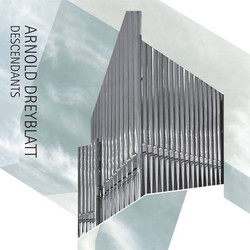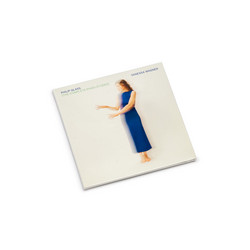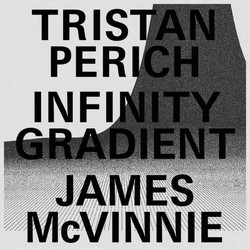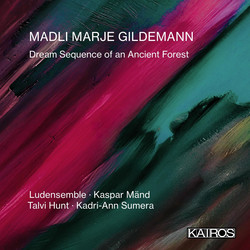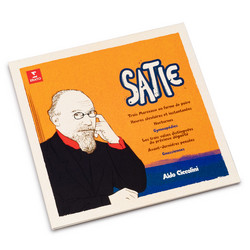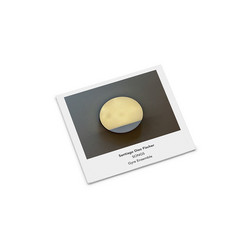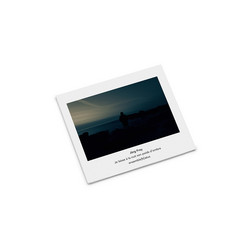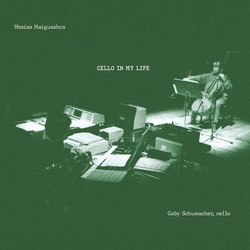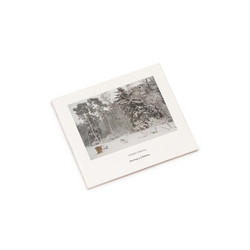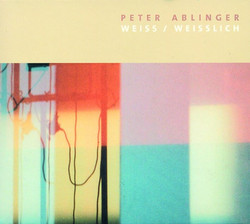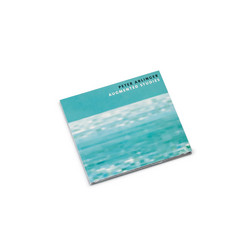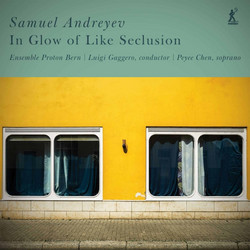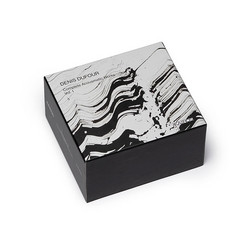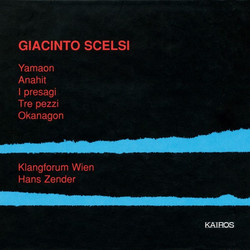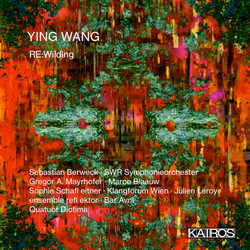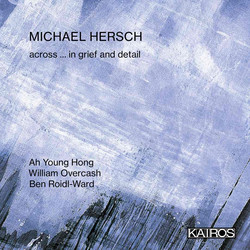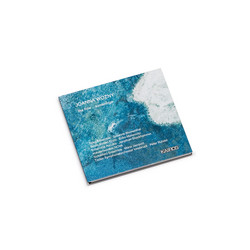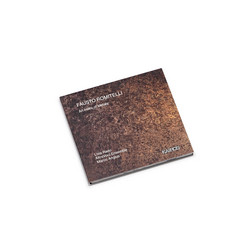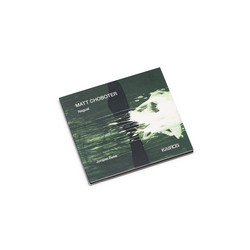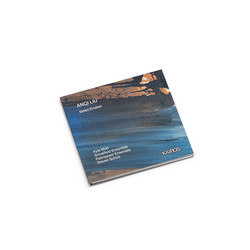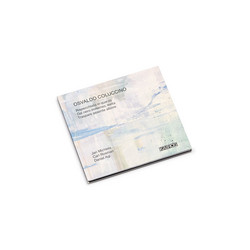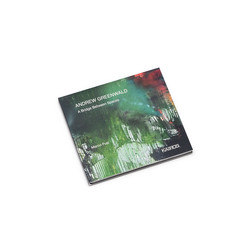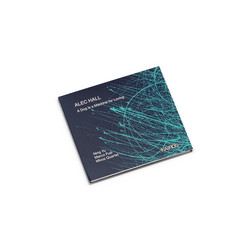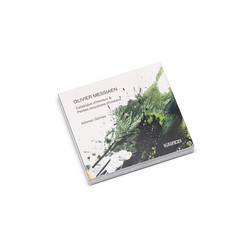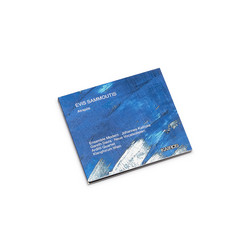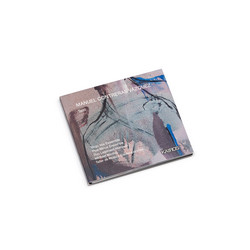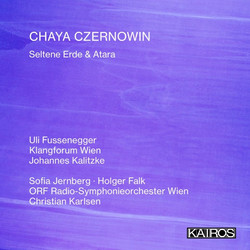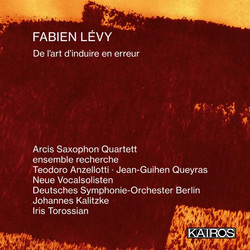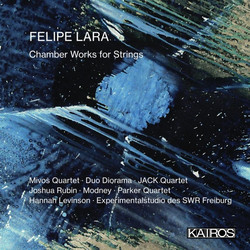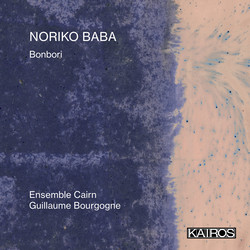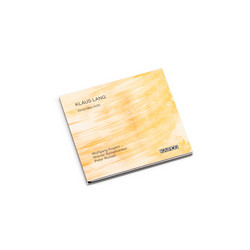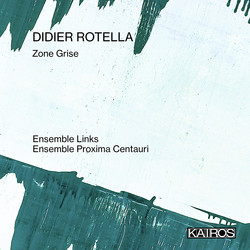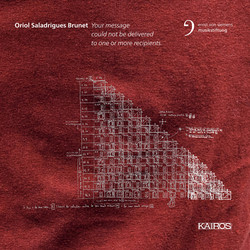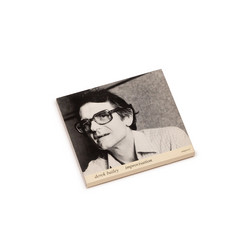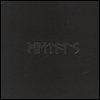Kairos presents Iridescent Notation by Samuel Andreyev. Recording Date: 22-27 Sep 2018. One of the most compelling voices to have emerged from the Canadian new music scene in the last decade is that of Samuel Andreyev. His music is equally communicative. The new disc offers half a dozen pieces which span his entire career. Luigi Gaggero conducts various combinations of the Ukranian Ukho Ensemble and provides an interesting booklet note which wavers between helpful explanation and subjective reflection, some of which I cordially admit goes right over my head.
He suggests that common to all these pieces is a disconnect within them, which pits their intrinsic humanity against a generic artificiality. If the former is characterised by the sensuality or earthiness of individual instrumental lines or gestures, the latter is epitomised by the deliberate coldness of technique (eg obsessive repetition) or artificial, plastic sounds (a Casio keyboard, which also featured in the previous Kairos Andreyev survey, or the synthetic halo produced by wine glasses are examples). Gaggero seems to be suggesting that the composer has found the means to reflect the tragedy of dehumanisation – as a social species we need each other, but our world is becoming increasingly ‘emotionally frozen’. Andreyev’s music is idealistic in the sense that its vibrancy and attractiveness provide the possibility of escape. At the time of writing this seems especially pertinent as human beings grapple with the societal and personal challenges presented by the post-Covid landscape.
The first two works on the programme both require a soloist. In Iridescent Notation, the most recently completed of these pieces, the soprano Maren Schwier necessarily utilises a variety of vocal stylings to communicate five elusive texts from the pen of the English-Irish poet Tom Raworth. Deep consideration of the singular layout of Raworth’s superficially Cummings-like texts in the booklet essentially renders them meaningless; these are words designed to be projected aloud, and Andreyev’s imaginative strategies enable the listener to catch a whiff of the writer’s all-too-fleeting preoccupations. He is helped enormously by Schwier’s dazzling performance. An exacting and exciting ‘overture’ incorporates an array of classic, archetypal instrumental devices; devilish swirls in the wind, short-lived jazz bass, creepy, cinematic piano – it’s punchy and attractive on the surface at least, although it is possible to detect the plasticity lurking in the shadows. In the five vocal numbers Schwier employs an extraordinary variety of means to convey the stop-start stream-of-consciousness in the broken phrases of Raworth’s elusive aphorisms – Andreyev’s taxing yet communicative vocal writing exudes allure. At the conclusion of this cantata many listeners will be surprised by the lyricism and lucidity at its heart.
I particularly liked the whimsically named mini piano concerto À propos du concert de la semaine dernière (Concerning Last Week’s Concert). The psychotic repetitions of brief sub-lyric/romantic clichés in the solo part in the first section of this work effectively reduce the whole to fascinating musical ‘babble’ – this is something of a parallel to the vocal writing in the preceding cantata. The accompanying instrumental septet’s commentary is apt but carefully avoids overlap; the listener’s experience is consequently akin to embarking upon a walk and reaching the destination, but in the course of so doing being so consumed by one’s personal anxieties that one has no memory of the journey. Andreyev’s solo writing is cagey rather than virtuosic in the main – this changes in the exhilarating final quarter of the piece. The entire edifice is always compelling and it is expertly made. Dina Pysarenko is completely inside Andreyev’s prickly writing; the incorporation of the colourful harp textures which come to the fore during the second half of the work is most impressive.
The mysterious, evocative title of Nets Move Slowly, Yet is extraordinarily suggestive of the sounds the piece contains. Its notes seem to be subsidiary in importance to the delicate textures that unfold. When a cor anglais or horn line emerges barely perceptibly and momentarily, it creates the potential for a specific atmosphere which disappears almost immediately. The greater part of the work is like a ghostly processional, the music proceeding carefully as if the ensemble is collectively treading water. Things begin to change with a long horn solo and a huge climax at 5:20 which creates a short-lived sense of liberation before music which is more mobile and emotionally ambiguous.
Le malheur adoucit les pierres (Bad Luck Softens the Stones) is a trio for bass flute, cor anglais and bassoon which comprises five tiny panels. These are rich in neutered lyricism; the instrumental lines are lonely and disparate, the gestures curt and abrupt. The second movement implies momentary distraction – its surface perkiness is somehow devoid of joy. The cascading, tumbling motions of its successor resemble a conversation à trois where each participant has too much to say and no desire to listen. The last piece shivers with paradoxically amiable sang-froid. Le malheur adoucit les pierres would provide apt incidental music for a Harold Pinter television play, perhaps.
Luigi Gaggero contends that Événements quotidiens (Daily Events) also incorporates elements which could be described as cinematographic, not least in its abrupt changes of pace or mood. During its seven-minute duration (it absolutely flies by) sharp and extended wind and brass chords are pitted against trembling string figures creating an atmosphere which is by turn bracing and ominous. Bell strokes exaggerate its mystery as well as marking the passage of time. The means by which these tintinnabuli are deployed by Andreyev to perforate the muffled wind and string drones towards the work’s denouement are most imaginative. The disc concludes with the tripartite ensemble work Night Divisions whose shimmering central Nocturne separates two outer Divisions which are both rather angular; the first blends violent explosions of drums with disconnected melodic ideas from a rather Middle-Eastern sounding cor anglais, breathy alto flute trills and hints of muted trombone while the second seems to be an even more jagged reflection of the first.
Andreyev already has a profound understanding of instrumental and ensemble potential – this invests his strange music with singular confidence and cogency. He’s not one to simply pay lip service to the past as his online lectures demonstrate – his grasp of it contributes to a language which paradoxically seems more personal and convincing with each new piece. Reading the note might lead one to believe this will be rather soulless, asocial music but I found it to be quite the opposite; amiable, bright, vibrant and rather provocative. This fine new Kairos disc certainly builds upon the success of its predecessor and in so doing amply reinforces this young composer’s burgeoning reputation. - Richard Hanlon

